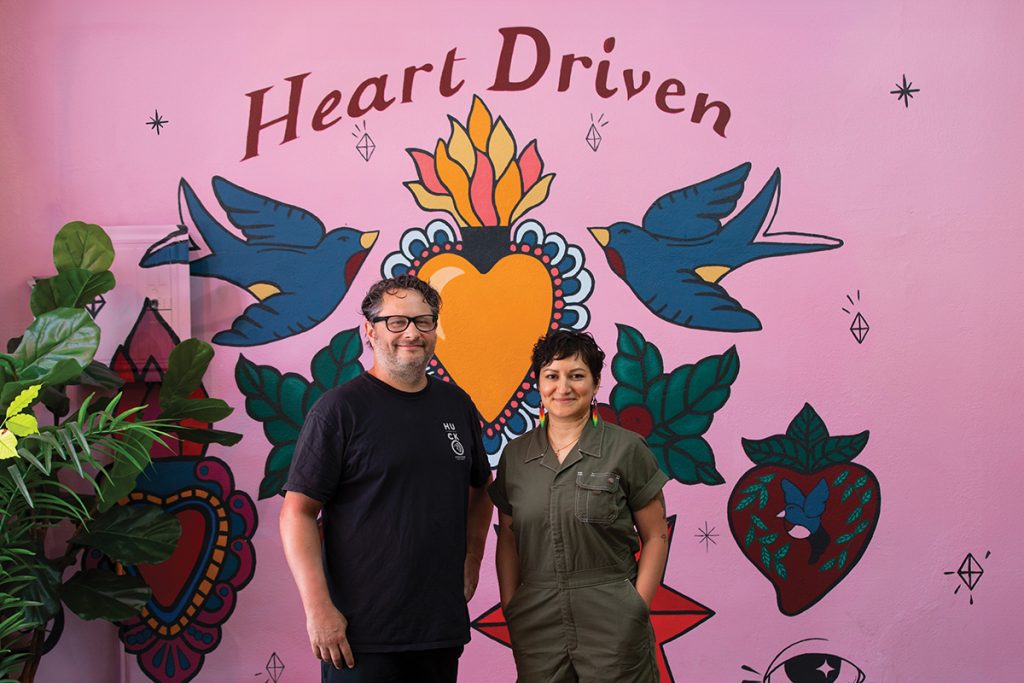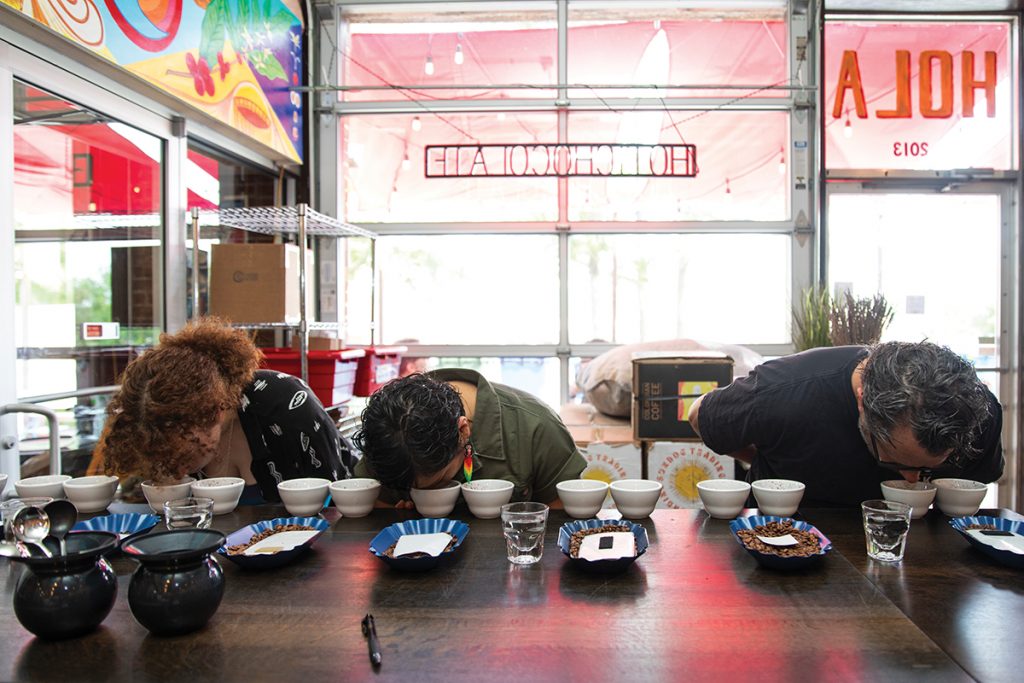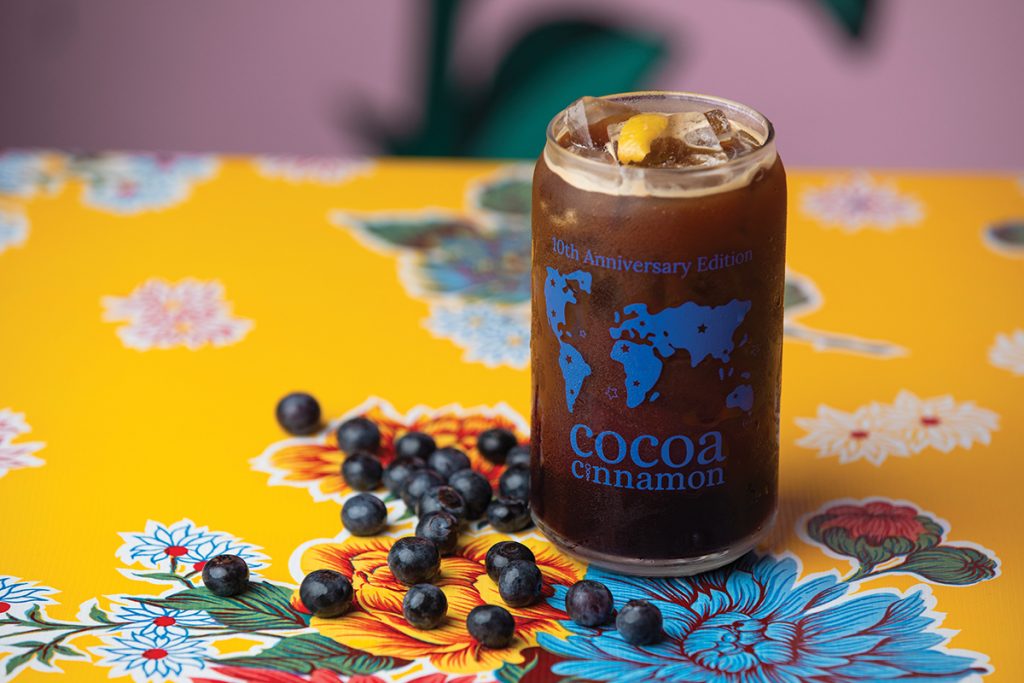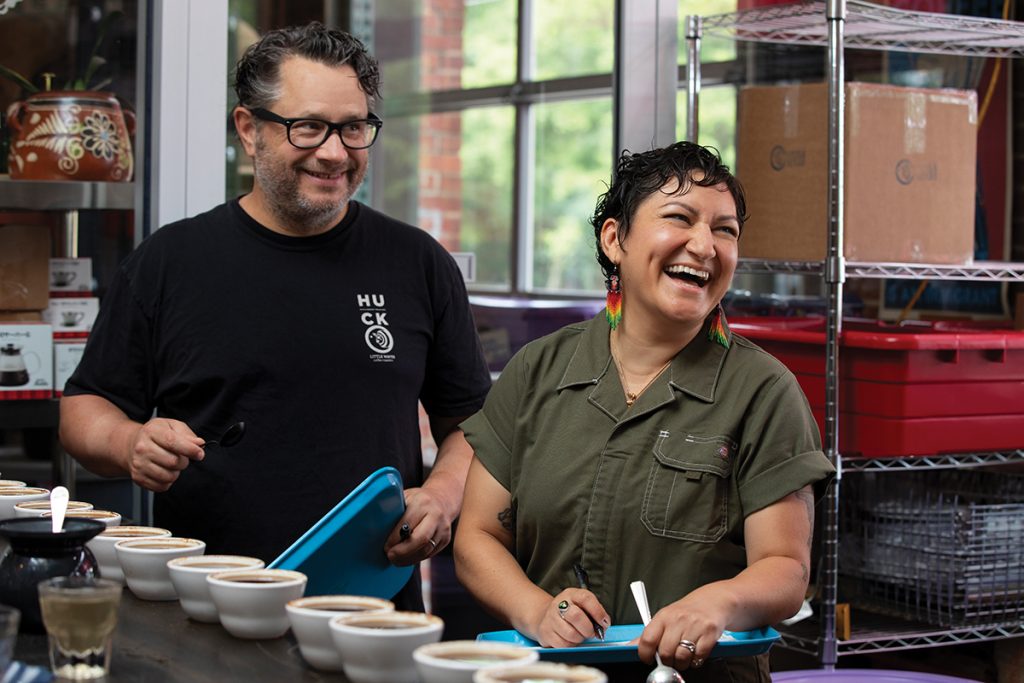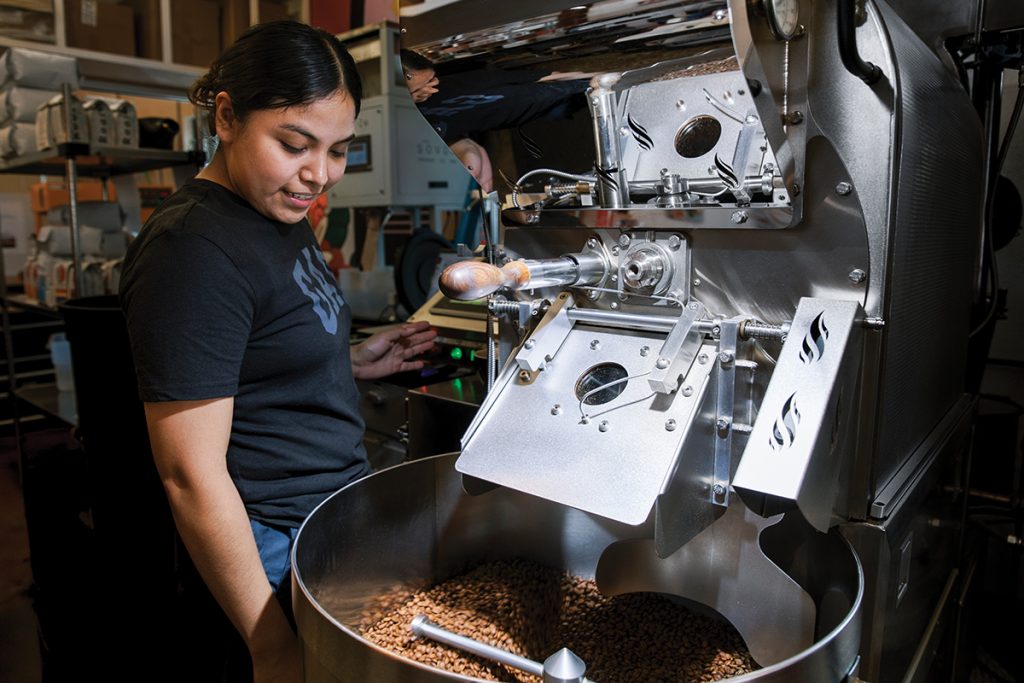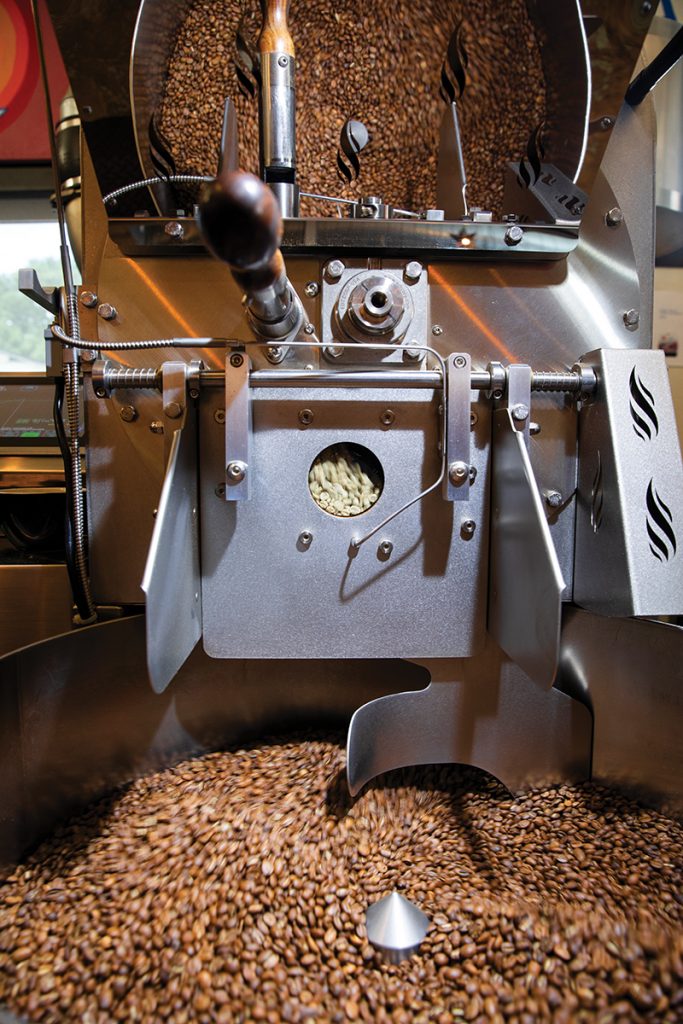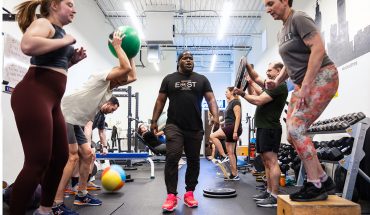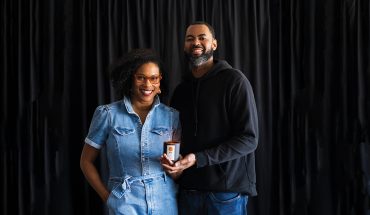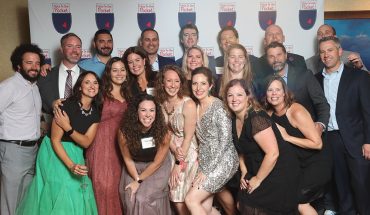Areli Barrera Grodski and Leon Grodski Barrera are Durham-based roasters that offer coffee with a focus on community.
by Finn Cohen | photography by Taylor McDonald
Areli Barrera Grodski is standing in a glass-walled section of her coffee shop, Cocoa Cinnamon, where the roasting department of her coffee company, Little Waves, churns out 1,800 pounds of coffee a week.
Longtime employee Pin Brent, who’s just as adept at brewing an espresso as roasting a batch, jumps between monitoring a roast of Ethiopian Yirgacheffe and loading another bin of beans for the next round.
The shelves behind Grodski are stuffed full of orders from their online business, with beans headed for customers in New York, Illinois, Kentucky, Michigan and Washington state.
“This is the phase in which you start creating body and some of those sugar browning notes,” Grodski says over the din of the roasting machine. “Once the development happens, that’s when a lot of those acids that are already part of the bean start to come out. The longer you take it into the roast, the more of those you get rid of.”
She pulls a small cylinder full of beans out of the roaster’s front, careful to pick up any bean that falls out in the process. She explains that these beans are in the phase known as “first crack,” when the hull of the bean splits as its chemical compounds start evolving. “That’s the pressure coming out,” she says, pointing to the beans. “So now go ahead and sniff it — it smells a little bit like vinegar.”
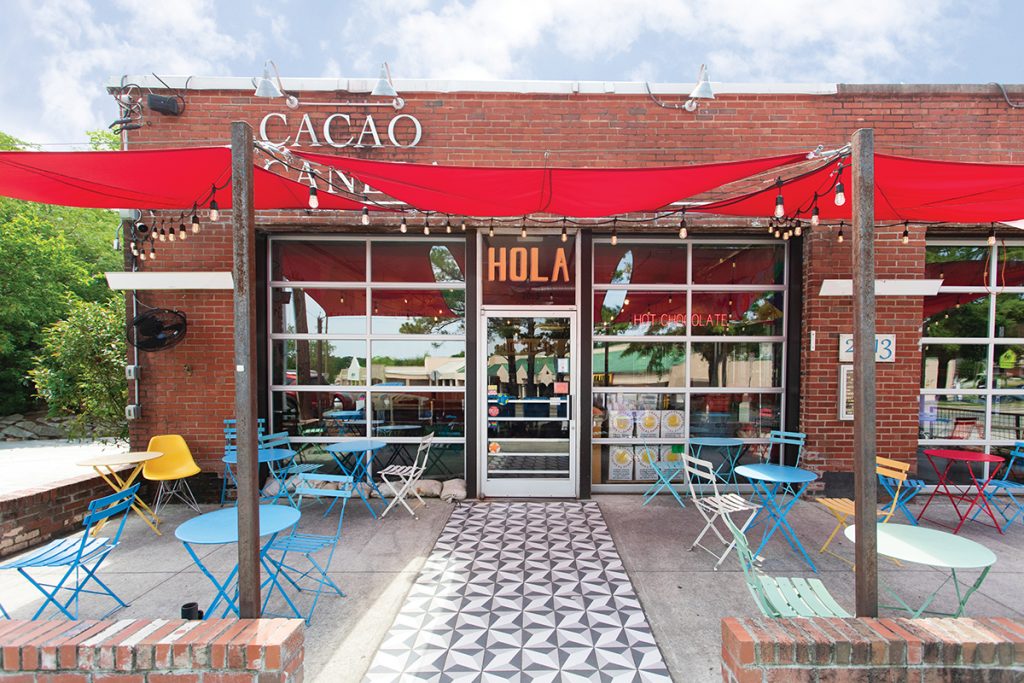
Vinegar is not a flavor anyone wants in their morning coffee; it’s just a step on the way to the deeper qualities. Grodski and her team are adept at pulling a plethora of notes from a wide variety of beans harvested from producers in Peru, Brazil, Rwanda, Ethiopia, Nicaragua, El Salvador, Mexico and Colombia.
Some of the coffees they offer are blends, like the Positive Pressure espresso (a “nutella, madagascar vanilla and cherry” combination from Mexico and Ethiopia), while others have intricate tasting notes, like the Edwin Enrique Noreña Pink Bourbon, from Colombia, which is described as “grape juice, guava, raspberry, gummy bears, in a bright, unique and juicy cup.”
It’s a wild coffee, with those flavors attributed to the beans’ fermentation process, which includes submerging them in a tank with grapes, figs and prunes.
Their skills have not gone unnoticed: in 2022, Little Waves won Roast magazine’s microroaster of the year award. Their beans can be found at Heirloom Brewshop, NOFO @ the Pig and Rebus Works, along with grocers Weaver Street Market and Whole Foods. And their three Cocoa Cinnamon locations in Durham are routinely packed with patrons working on laptops, reading or deep in conversation.
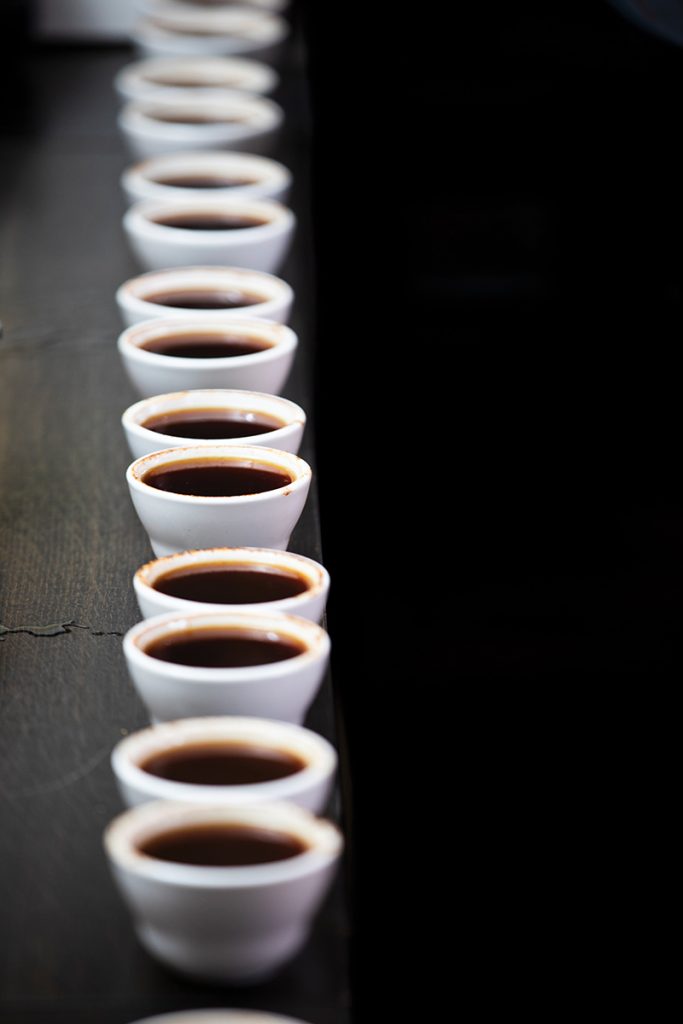
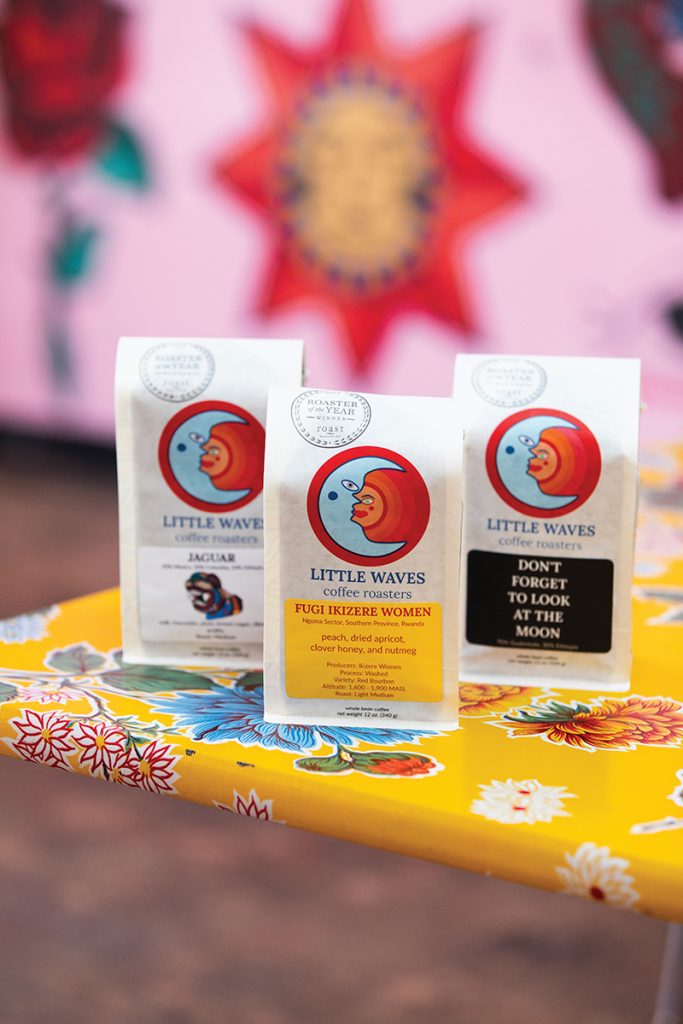
A Coffee Community
The current operation is a far cry from a decade ago, when Grodski and her husband, Leon Grodski Barrera (the two took each other’s surnames) were pedaling a three-speed bike full of beans, grinders and immersion brewers around downtown.
“Durham doesn’t seem hilly until you put a 400-pound espresso machine on a bike,” laughs Barrera. “I have every ridge memorized in my body. We would take really long routes just to not have to go up and down hills.”
The couple moved to Durham from Cherokee, a small town on tribal land in Western North Carolina where Barrera ran a coffee shop slash art space called called Lift (where Qualla Java is now located) that was a central part of the community.
He had been a multimedia artist in New York City for years, and while working in 2001 on a project that got installed at the old CAM in Raleigh, he got to know this artistic community in the state. He became a resident artist at Western Carolina University a couple years later, and then ended up in living in Cherokee through a relationship with someone who was a member of the tribe.
Grodski was born in Mexico but moved to the United States when she was 6 and grew up in Cherokee. She attended the University of North Carolina at Chapel Hill but returned after graduation in 2009.
They’d known each other for several years, but fell in love after she was back in town and were married in 2010. On their honeymoon, the couple was sitting at a café in Verona, Italy, discussing their plans. They knew they wanted to start a business, and they both saw how important and vital Qualla had been to the Cherokee community.
“When it’s a small town, it’s usually just like, sports, church, gathering in parking lots,” Grodski says. “So it was really nice to see how it could create space for community. And that was something that really inspired me.”
Part of Grodski’s studies at UNC involved Indigenous literature from Latin America, which resonated with the experience of living in Cherokee — and the parallels between each place’s struggles under colonialism. Coffee, she says, “was the vehicle for that.”
“I feel like coffee has all of these different dimensions of understanding the world, understanding yourself, how you show up in community, how you dial in that espresso, how you source beans,” Grodski says. “When you are creating a business that is so centered on community, you have to recognize how you are as a person and how you show up — how you react to different, especially really hard, situations in a community. And how societal ills will show up at your front door.”

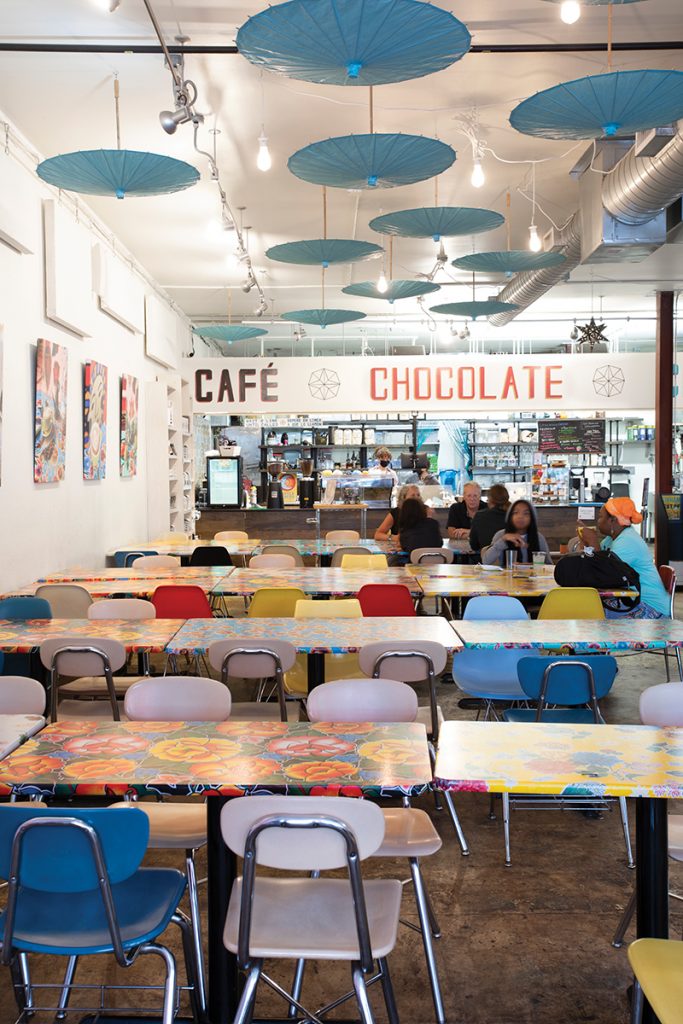
From Bike to Brick & Mortar
Durham made sense for creating such a space. In 2010, the city’s downtown was just at the start of the transformation into the bustling hub of commerce that it is today, and the couple saw an opportunity to create the type of café in Durham that Qualla was for Cherokee.
So they started running a business off of that converted bicycle, pedaling between farmer’s markets and events in Durham at places like Scrap Exchange and Motorco. They’d wanted to have an “espresso bike,” but gravity had other plans.
“As we were building it, Leon rode it without anything on it, and he was like, there’s just no way we can add any more weight to this,” laughs Grodski. So they settled on using immersion blenders called Clevers — a four-minute brew — but then the weather foiled them.
“I was outside Motoroco till one o’clock in the morning and that night it was like 19 degrees,” says Barrera. “I’m sitting there with Clevers and all of a sudden you can’t brew coffee at 19 degrees if you’re letting it sit there for four minutes.” They pivoted the business plan to use Aeropresses: vacuum-press devices that make a strong, espresso-type cup.
It was a more resilient way to do an outdoor café with the bike, but it was also very labor-intensive, as the “press” part of the Aeropress requires a lot of elbow grease and timing. (They also only used hand grinders since they couldn’t lug a lot of electricity around on the bike.)
“It was a lot of hard work — but was also really beautiful,” says Barrera. “We would set up at the Hunt Street Farmer’s Market and people would stand in line just to be social. It took forever, but we would just have a line across the street, and it would just be brewing three at a time on Aeropresses — just busting our butts.”
By 2013, the couple had established a name for themselves in Durham with a better understanding of the community and the market. A brick-and-mortar location made the most sense, and there was an ideal location on Geer Street, near Motorco and Fullsteam Brewery.
But they only had $75 and zero credit. The person who owned the building, Bob Chapman, had fielded business plans from more than a dozen people who wanted to open a coffee shop in the location.
“The way I interviewed them was sort of the same for each one: I said, OK, meet me at your favorite coffee shop at 7 a.m. Let’s visit it and I want to hear your critique of how they’re running their company, their shop, and then we’ll go to several others,” says Chapman. “I pretty much found out that a lot of these people didn’t know anything about coffee — or running a business.”
Chapman says Grodski and Barrera had something no one else did: They knew a lot about coffee and had been putting that knowledge into practice with hard work. And they saw their mission, in part, as being part of a community.
“They came over and they brought this tablecloth, and these beautiful ornate coffee pots, and silver- and gold-covered chocolates,” says Chapman. “And some really good coffee! Their opening statement was, Bob, we like the way that you are curating the street.”
Chapman ended up cosigning a business loan for the couple to get started. The flagship Cocoa Cinnamon, across from Geer St. Garden and near an elementary school, has cozy indoor seating and ample outdoor tables, with lots of planters and string lights around an awning.
Offerings at Cocoa Cinnamon have plenty of coffeeshop staples: espresso, drip coffees and pastries. But they’ve also got creative coffee tonics that incorporate flavors like peach, pomegranate and blueberry; house lattes with cayenne or mole-inspired flavors; and freshly made churros.
Once the business started doing well, they stumbled into a second location a bit further west, closer to the campus of Duke University. A similarly friendly arrangement with the landlord helped get that storefront off the ground.
Around the same time they found a third spot — their time in Durham building connections was vital to that one as well — with enough room to build a roastery and start buying their own beans.
Fostering Deep Connections
The business was never just about brewing coffee. Barrera had experience on the roasting side from the coffee shop in Cherokee, and both he and Grodski wanted to find a deeper engagement with farmers around the world and to offer their customers something unique. This new side of the business needed to be built on the principles of fair trade.
“As we started roasting our own beans, I was still wanting to have an array of coffees on the menu that still provided that tasting experience while connecting with how to do this in a way that’s sustainable, and that takes into account all of the dynamics of what it takes to produce coffee,” says Grodski, who was also interested in working with coffee growers whose experiences she could relate to.
“Being a woman in the roasting industry wasn’t as common. Let alone who I was talking to on the sourcing side: the importers were predominantly men. So I was just kind of seeking out other women to connect with — specifically women of color. And that kind of just led down this path, making these beautiful connections.”
One of those women, Phyllis Johnson, runs BD Imports out of Georgia and founded the Coffee Coalition for Racial Equity in 2020, a nonprofit focused on creating opportunities for Black Americans in the industry. Much of her importing is from Brazil, through Black farmers who own their land, a rarity in the business.
“Brazil’s coffee industry was basically built on the backs of Black people through slavery, and that’s what made Brazil become the leading country of coffee,” Grodski says. “It’s actually the country that affects the price value that you buy coffee at.
When Brazil has a bad year, the price of coffee goes up. When Brazil has a good year, the price of coffee goes down.”
Being mindful about the dynamics and history of coffee was something Grodski and Barrera wanted to do as they expanded the business, even if it meant paying a little more for beans; the approach of getting the cheapest price for maximum profit wasn’t one they wanted to take.
“If you think about coffee’s origins, they come from some of the poorer places in the world. There can be this imbalance, and our approach is more of, how do you do this as a partnership?” Barrera says. “How do you connect quality, relationship and impact?
If you’re bringing all of those three together in an ongoing rooted way, it can create these relationships that last through time and can cumulatively build much more sustainable, equitable, thoughtful and delicious outcomes.”
Similarly, part of the Little Waves ethos about community also means being deliberate about hiring and cultivating those employees with fair wages. Among their nearly 40 employees, the base hourly rate is $17.60, and they’ve had some employees rise through the company over the course of many years. But Grodski and Barrera also wanted to make sure the people working for them reflected the communities that make a city like Durham as multifaceted as it is.
“Our team makeup is 92% women or nonbinary folks. We represent 10 countries, eight languages; we’re a very diverse team,” Barrera says. “We have a Spanish-speaking person working here at all times, and when we first opened, we had three people who spoke almost no English, but their co-worker was bilingual.
Through that experience, it was like, if you’re going to come into the shop, you have to be willing to wing it with our staff.”
Maricarmen Paz Hernandez, who manages the roastery, started as a barista when she was 17 — she’s now 24. “It’s really a privilege to be growing with a company like this, that provides opportunities to grow — especially since I’m a Latina,” Hernandez says. “We’re Latina-led and Latina-forward, and that’s not really normalized in a coffee roastery.”
As the roasting side expanded — they’re currently working on a larger facility to accommodate its growth — Little Waves has stuck to the principles they started with: open dialogue with a community, hard work and efficiency. It’s a delicate balance, but they see their success as a way to address the lingering effects of colonialism — abroad and at home.
“It’s just kind of bringing that history and that presence to the present day and shining a light on that representation that we want to keep seeing,” says Grodski. “And our guests love the coffee,” adds Barrera.
This article originally appeared in the December 2023 issue of WALTER magazine.

